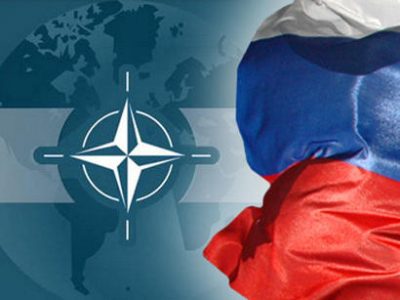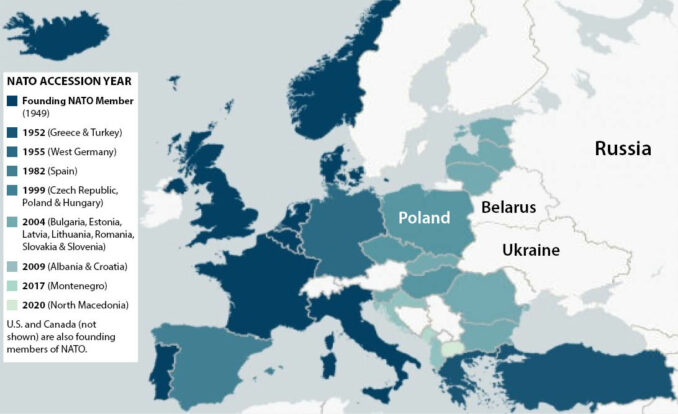Russia’s Demands Challenge NATO’s Threats

All Global Research articles can be read in 51 languages by activating the “Translate Website” drop down menu on the top banner of our home page (Desktop version).
To receive Global Research’s Daily Newsletter (selected articles), click here.
Visit and follow us on Instagram at @globalresearch_crg.
***
Russian President Vladimir Putin at his End of the Year Press Conference, Dec. 23, 2021, speaking to 500 domestic and international journalists, said the following:
“We have made it clear that any further movement of NATO to the East is unacceptable. Is there anything unclear about this? Are we deploying missiles near the U.S. border? No, we are not. It is the United States that has come to our home with its missiles and is already standing at our doorstep. Is it going too far to demand that no strike systems be placed near our home? What is so unusual about this?”
This statement makes it clear who the aggressor is in the latest and continuing confrontation between Russia and U.S. imperialism. Yet the U.S. corporate media reported it as bellicose, threatening, unreasonable, an ominous warning of a Russian invasion of Ukraine. President Joe Biden promised “serious consequences.”
As U.S. policy grows more reckless, the corporate media perceives threats everywhere. After Putin and Biden spoke by zoom, Putin and President Xi Jinping of China had a New Year’s exchange Dec. 15. This conversation was headlined by The Hill as “‘Allies’ China and Russia Are Ganging Up on America.”
Yet NATO expansion is in direct violation of U.S. agreements with the then-USSR, agreements that the U.S.-commanded and dominated military alliance would move “not one inch eastward.” U.S. Secretary of State James Baker in 1990 pledged this to former president of the USSR Mikhail Gorbachev, promising that a reunified German state in the heart of Europe would present no threat to the Soviet Union.
Putin’s statement above summarizes the Russian government’s position leading up to scheduled Jan. 10 talks in Geneva, Switzerland, to discuss Russian demands to stop U.S./NATO expansion to its borders. Meanwhile, the U.S. corporate media reports Russia’s troops within Russia as a buildup on the border with Ukraine.
What President Putin is addressing is the further expansion of NATO through Ukraine’s absorption into an aggressive, U.S.-dominated military alliance.

NATO keeps expanding
Since 1990, U.S. and West European — especially German — imperialism have shared a policy toward formerly socialist Eastern Europe: They aimed to consolidate capitalist property relations under Western economic domination. For this to succeed they began organizing the state itself, its police and military, under U.S. military command. To lock in place this transfer of property, they insisted on NATO membership for each country.
Beyond the imperialist reconquest of Eastern Europe was the effort to totally dominate and loot Russia. The collapse of the Soviet Union and the separation of former Soviet republics into small, dysfunctional “independent” countries whetted U.S. imperialist appetites.
During the years Boris Yeltsin was president of Russia, 1991-99, the corrupt bureaucrats and criminals who had seized control of the formerly nationalized industries became oligarchs. These new rulers sold entire industries for scrap metal to curry favor in the West and enrich themselves. They expected to be welcomed as equals into the imperialist bloc.
No way.
Putin blocks looting
What Putin has attempted, especially in the past decade, is to stabilize and consolidate capitalist property relations in Russia, ending the wild looting and economic chaos of the Yeltsin years. He has not sought to reestablish socialist property relations but to defend Russian nationalist interests.
Outside Russia, the Putin government provided air cover and vital military aid to Syria that halted the imperialist attempt to overthrow the Syrian government. Russian missiles shipped to Venezuela have provided that government with some needed air cover. These steps outraged imperialist forces determined to reassert their domination of oil-rich Western Asia and to control all of South America.
What is barely mentioned in all the current reporting of a Russian threat is that the U.S. is supplying $450 million additional funding in weapons to Ukraine. Together with U.S. aid to bring about the reactionary February 2014 coup in Kiev, Ukraine’s capital, that adds up to $2.5 billion. There is $60 million more in small arms, ammunition and radar systems.
Britain, NATO member and U.S. junior partner, is constructing two naval ports for the pro-imperialist Ukraine regime on that country’s Black Sea shoreline. One is in the Sea of Azov, that is, between the Russian naval base on the Crimean Peninsula and the rest of Russia. London is also lending the U.S.-installed government in Kiev $1.6 billion to pay for an assortment of British-made naval vessels.
Western military officials are discussing deploying new technology, including nuclear-capable missiles, in Poland and Latvia and along Ukraine’s Russia-facing eastern front.
Background to Jan. 10
Russia’s position for the Jan. 10 meeting:
- NATO should cease its efforts to expand eastward into Ukraine and Georgia;
- NATO guarantees that it will not deploy missile batteries in nations bordering Russia; and
- An end to NATO military and naval exercises in nations and seas bordering Russia.
It is important to review this pledge today in the present crisis.
In 1990 then Soviet President Gorbachev was facing a social upheaval internally, following the opening of the Soviet Union to Western-funded programs and ending the leading role of the Communist Party. Seeking a deal with imperialism, Gorbachev allowed the annexation of the German Democratic Republic — which the Soviet Union had a legal right to veto.
Gorbachev had received assurances that NATO would not expand after he withdrew all Soviet forces from Eastern Europe, and not just from Baker. U.S., Soviet, German, British and French documents declassified on Dec. 12, 2017, and posted online at George Washington University, revealed a torrent of assurances which Western leaders gave Gorbachev and other Soviet officials, throughout the process of German unification in 1990-91. They all promised Soviet security.
These documents reveal that U.S. President George H.W. Bush, West German Foreign Minister Hans-Dietrich Genscher, West German Chancellor Helmut Kohl, CIA Director Robert Gates, French President Francois Mitterrand, British Prime Minister Margaret Thatcher, British Foreign Secretary Douglas Hurd, British Prime Minister John Major and NATO Secretary General Manfred Woerner made promises similar to Baker’s pledge of NATO expanding “not one inch.” (tinyurl.com/mr4atc3m)
The absorption of the German Democratic Republic (East Germany) into the imperialist bloc, the collapse of the Soviet Union in 1991 and the dissolution of the Soviet-led Warsaw Pact left NATO as a totally unopposed, aggressive military alliance. NATO first asserted its military capacity through bombing campaigns and troop deployments to carry out the breakup of the Yugoslav Socialist Federation through the 1990s.
Since then, the U.S. military has led the NATO military alliance in a series of wars, invasions, bombing campaigns and occupations, including in Iraq, Yugoslavia, Afghanistan, Libya and Syria and in subversive regime-change operations throughout Eastern Europe, Western Asia and Africa.
In every former socialist country in Eastern Europe, regime changes reinstated capitalism. It was a brutal and wrenching political and economic transformation. With Washington’s assistance, reactionary monarchists, religious clerics, former Nazi collaborators and Wall Street economists flooded into the entire region.
Hundreds of social organizations, NGOs, schools and publications received billions of dollars in U.S. funding, through USAID programs, to reorganize society on a capitalist basis. They aggressively rewrote constitutions along with banking and new ownership laws, privatized and sold off major industries, dismembered social services and looted pensions.
To consolidate and protect these brutal thefts of socialized property from potential popular resistance, the imperialists turned to the NATO military alliance. The collaborators in each capitalist-reorganized country had to join NATO, in the process borrowing to pay for U.S.-made military equipment and pledging thousands of their soldiers to fight in U.S. wars.
New right-wing governments in Poland, Hungary and the Czech Republic applied for and were quickly accepted into the NATO alliance in 1999. The former Soviet Republics of Estonia, Latvia, Lithuania, all bordering Russia, were admitted to NATO in 2004, as were the right-wing governments in Bulgaria, Romania, Slovakia and Slovenia. Albania and Croatia were admitted into the military alliance in 2009, Montenegro in 2017 and North Macedonia in 2020.
From 16 members in 1990, NATO grew to 30 members today.
U.S. coup in Ukraine
It was the fierce political struggle over Ukraine joining NATO that led to the aggressive U.S.-orchestrated coup in 2014. The U.S. government pumped $5.1 billion into the country to carry out an enormous social engineering campaign and regime-change operation against the elected government.
A Dec. 13, 2013, speech by Assistant Secretary of State for European and Eurasian Affairs Victoria Nuland to the U.S.-Ukraine Foundation, a U.S.-funded nongovernmental agency, revealed the price tag for this Ukrainian operation.
The Western media reported the coup as a democratic renewal. But the Euro-Maidan Uprising, in Kiev, was led by Right Sektor and neo-Nazi militias. After months of street protests, these forces literally overran government buildings on Feb. 22, 2014, forcing elected President Viktor Yanukovych and many of his officials to flee for their lives.
Nuland and European officials immediately declared the new regime “legitimate.”
Protesting the illegitimate overthrow of their elected president, mass movements in the more industrialized Donbass in Eastern Ukraine and in Crimea held referendums, seeking separation from this right-wing seizure of power in western Ukraine. Russian forces moved into Crimea to secure Russia’s only warm water port on the Black Sea.
This impasse has continued since 2014.
The U.S. and European Union imposed harsh sanctions on Russia for resisting NATO’s military expansion. The economic sanctions are especially focused on rupturing Russia’s ability to sell oil and gas to Germany by blocking the Nord Stream 2 natural gas pipeline. Tying Europe’s energy needs to fracked natural gas from the U.S. increases U.S. imperialist leverage against its EU allies, which are also capitalist competitors.
U.S. always violates agreements
The U.S. government violates treaties at will. This is imperialist diplomacy, confirmed by hundreds of broken treaties with Indigenous nations within the U.S.
Along with violating its promises regarding NATO expansion, Washington violated two publicly signed international agreements of great importance. The U.S. broke the nuclear agreement (JCPOA) signed in 2015 along with Iran and Britain, France, Germany, China and Russia and the U.N. Security Council.
Washington is now flagrantly violating the 1979 agreement recognizing the People’s Republic of China as the sole legitimate government of all China including Taiwan.
Breaking these treaties may have unforeseen consequences, causing U.S. targets to forge alliances. In his 1997 book, “The Grand Chessboard: American Primacy and Its Geostrategic Imperatives,” imperialist strategist Zbigniew Brzezinski warned:
“Potentially, the most dangerous scenario [for U.S. domination] would be a grand coalition of China, Russia, and perhaps Iran, an ‘antihegemonic’ coalition united not by ideology but by complementary grievances.”
*
Note to readers: Please click the share buttons above or below. Follow us on Instagram, @crg_globalresearch. Forward this article to your email lists. Crosspost on your blog site, internet forums. etc.
This article was originally published on Workers World.
Sara Flounders is a regular contributor to Global Research.

